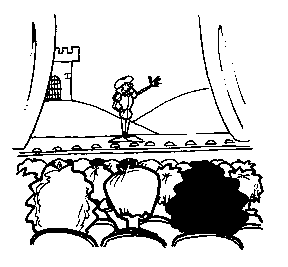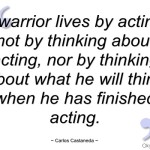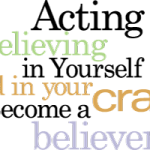Having written about writing, I guess I should act about acting. But no, here I am writing about it. Since I’ve already written a fair amount about my acting history and at least two of the plays I’ve acted in, you may wonder what I would have to write about. The answer is probably the technique, the emotion and the sheer joy of being out there on stage without a safety net. It’s a buzz, an adrenalin rush like few others once you have got to the age where you’re unlikely to start jumping out of planes or ski-ing down Alpine pistes.
Granted that it’s not for everyone, but I’ve found many benefits. One is that it pushes me to take risks and achieve things I might not otherwise achieve. All the best achievements in life take effort and dedication, but are incredibly rewarding when you’ve done them. In the case of amateur acting you have your normal daily life to lead but then to learn lines, moves, props, and more particularly to get beyond merely playing the character and be the character – inhabit them!
Often you feel like you can never master it, yet somehow it comes, bit by bit, til you can command the stage. The process feels like learning to drive: you feel like you can never remember the fifteen things you have to do at once, yet when it comes it is second nature – you don’t have to think about it. Much as a concert pianist will let his or her fingers play the notes mechanically, driven by the subconscious memory, (s)he can focus on the performance, the emotion.
It’s an extraordinary and powerful feeling when the character finally gets under your skin – you find yourself behaving as they would behave, talking like them, thinking as they would think, and unless you get to that point there is no way you can ever be credible such that an audience suspends its disbelief and want to know what happens next. It can’t be planned, it happens subtly over a period of time. Amdram has a reputation of actors woodenly reading lines, but trust me we spend much time to get into character – the difference being that the professionals do it all day, every day where we can only rehearse on a few evenings a week!
That notwithstanding, learning lines can often be a chore, one which every actor solves in a way that works for them. In my case, I read and repeat out loud time and time again, then go back and do the same without the book until I get it right. Then you do it at rehearsal and associate the lines with moves or actions, and magically they slip into place. Mind you, I used to get some strange looks when I was mumbling the lines in the gym or on the train ride home from work, but assumptions of my madness were a small price to pay for the joy of getting it right, without prompts.
Not requiring prompts was for me a matter of pride. I went through a lot of productions without any, and when I did need to be prompted I felt my ears burn in embarrassment. That was still better than the inexperienced prompt who did not recognise a deliberate and dramatic pause, coming in with the line immediately. After the show I pursued him with vigour to protest my innocence and to ensure he would not repeat the cardinal error!
Some of the challenges are just daft: learning a major role like Selwyn Piper in Murder by the Book while starting three weeks after the rest of the cast, and in the knowledge that I would be away on holiday for two weeks, was pretty scary, but buoyed on by the fear of screwing up in public, I did get it right. It really was alright on the night, though along the way I was petrified of humiliation in front of my friends and family, and there is no greater motivator than that!
For me the greatest moment was in an Agatha Christie play called The Unexpected Guest, in which I was cast, somewhat beyond my range, as a 19 year old with a mental age of 12. There was a section in Act 2 where I had to rant on at the other characters, then pause downstage, arms folded, before ranting some more. I remember on the Saturday night that the atmosphere was electric; as I stopped downstage for two or three seconds you could have heard a pin drop. I did my bit then took my exit, tears streaming down my face. For the first time in many years of stage appearances, I thought to myself, “you can really act.”
On the same performance, at the denouement there was a scene where one character was talking hypothetically about what he would have had to do, were he the killer. He was supposed to say, “he would have had to dye his hair and shave his beard,” but it came out as “shave his hair and dye his beard.” The audience was completely oblivious to this mistake, but behind the scenes the cast and crew were falling about in silent hysterics…
Which brings me to two other reasons for doing this acting lark: it’s a great laugh, particularly when you are working with a company, but there is a constant risk that something will go wrong. Let’s face it, wherever you have sets held up by weights, flimsy doors, furniture gathered from any source, assorted props and cast and crew all desperately trying to do their jobs, there is plenty of scope for disaster and injury.
Apart from my running into a black-painted box on stage with lights down, barking my shins in the process, arguably the most trouble I’ve ever had is with guns. Sure as eggs is eggs, guns work perfectly in rehearsal and when being tested, but if the audience is there… not a sausage. As an actor, what do you do? Try again, maybe? Shout “bang” and run? There was one occasion in a production of Murder on the Nile when the gun was supposed to go off but didn’t. The actor holding the gun looked transfixed, panicking. The victim took matters into her own hands and ‘died’ spontaneously with a grace slide, only for the gun to go off some seconds later. I did not hear laughter from the audience, being rather more concerned with timing my run towards the victim from stage left, but surely this dramatic moment must have been marked by loud guffaws as reality intruded on the emotional tension.
But in the final analysis, what makes it worthwhile is the applause as you do the bow. Sadly, that moment of joy and rapture, as you bask in the adulation on the third and final night, is soon gone. Before you know it, the post-production party is history, the set has been dismantled and the anticlimax sets in. That’s when you get the DTs and need more more more to feed the addiction.



